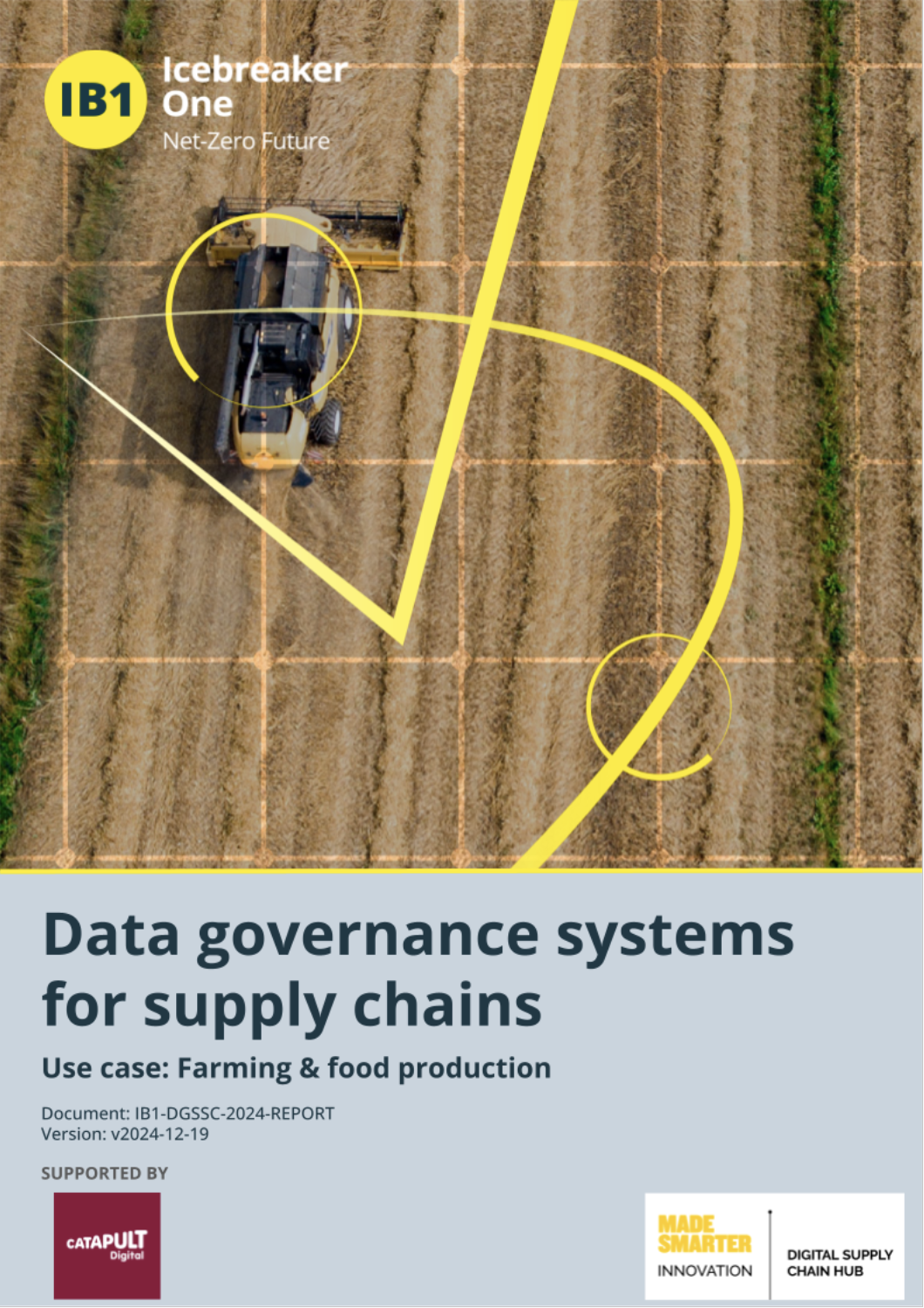
Data governance systems for supply chains report – download full report
In collaboration with Digital Catapult’s Digital Supply Chain Hub, Icebreaker One worked on a project to help transform UK manufacturing through data-enabled supply chains. This work culminated in a final report titled ‘Data governance systems for supply chains’.
Executive summary
The Made Smarter Innovation | Digital Supply Chain Hub initiative delivered by Digital Catapult aims to better connect supply chain stakeholders in order to improve efficiency, reduce costs and contribute towards the UK’s net-zero targets. Connection between stakeholders relies on building trust within and throughout supply chains. The development of a robust data governance framework for the Digital Supply Chain Hub ecosystem has the potential to transform supply chains by promoting trust as well as enhancing financial accessibility, streamlining technical interoperability, enabling innovation and investment in technology, and driving sustainability.
To take this abstract concept and prove its efficacy, this project focused on defining one specific use case within the food supply chain, through engaging deeply with stakeholders and then creating an MVP to establish the data infrastructure for trusted data sharing.
Doing one thing well
Our defined use case focuses on one of the most significant inputs for UK farmers: fertilisers. Fertilisers are a significant driver of global greenhouse gas emissions, accounting for 2.6 gigatonnes of CO₂e annually—more than the emissions from aviation and shipping combined.
Farmers have substantial potential to reduce the emissions associated with fertiliser use. Studies suggest that global fertiliser emissions could be reduced by as much as 80% by 2050 through measures such as optimising application techniques, adopting precision agriculture, and transitioning to organic or low-emission alternatives.
At the same time financial organisations, such as banks, are interested in understanding their financed emissions within agriculture as well as financing the transition to sustainable farming practices. To do this effectively, financial organisations require access to trustworthy data from the food supply chain. However, current methods of sharing data from farm to financial organisation can often be manual and inconsistent. This creates additional costs and inefficiencies as well as risks regarding data quality.
| Use Case: To access green financing, UK farmers must share assurable data on fertilizer usage reduction with financial organisations. |
Governance to go further together
With a complex, multi-stakeholder problem, it’s critical that solutions are defined together. For this project, Icebreaker One (IB1) used its governance mechanism to create an advisory group representing stakeholders from across the food supply chain. The group then helped to define our use case and steer the direction of travel for our technical MVP including the proposed rules to enable data sharing in an open, automated, scalable, decentralised and interoperable way.
Building better trust in data
Assurance is a person’s confidence in the reliability or trustworthiness of something, based on evidence or predefined standards. Assurance Signals can be attached to data using metadata that gives evidence for how trustworthy the data is. Machine-readable assurance signals make this process efficient by allowing computers to quickly verify and assess the data’s trustworthiness.
The project’s MVP builds a model of how assurance signals can be used to provide a higher degree of trust when it comes to farm’s fertiliser reduction, that flows from a farm management system through to a carbon accounting platform and on to a financial organisation like a bank. This creates value for multiple stakeholders, not least unlocking green financing opportunities for farmers.
The potential for impact
The development of a robust data governance framework for the Digital Supply Chain Hub ecosystem has the potential to transform UK agriculture by promoting trust, enhancing financial accessibility, and driving sustainability. It aligns with net-zero ambitions while supporting the resilience and productivity of UK farms, ultimately contributing to a more secure and sustainable food supply chain.
Recommendations
In order to fully implement a data governance framework we recommend to:
- Validate assurance signals: UK arable farmers and their supply chain actors must be engaged in order validate assurance signal feasibility.
- Establish a full governance framework: An Advisory Group must continue to be convened to ensure the co-design and implementation of a market-wide solution, which addresses specific user, technical and non-technical requirements.
- Onboard demonstrator partners: Relevant partner organisations from the supply chain must be brought together to deliver a demonstrator that shows assurable data flowing from farm to bank.
- Co-design implementation of a technical demonstrator: Relevant partner organisations must co-design and establish the data infrastructure, including assurance metadata records.
